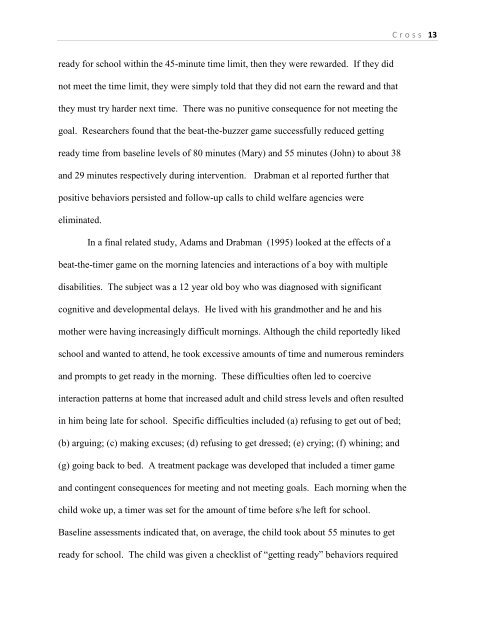THE EFFECTS OF A TIMER AND MYSTERY MOTIVATORS ON THE ...
THE EFFECTS OF A TIMER AND MYSTERY MOTIVATORS ON THE ...
THE EFFECTS OF A TIMER AND MYSTERY MOTIVATORS ON THE ...
You also want an ePaper? Increase the reach of your titles
YUMPU automatically turns print PDFs into web optimized ePapers that Google loves.
C r o s s 13<br />
ready for school within the 45-minute time limit, then they were rewarded. If they did<br />
not meet the time limit, they were simply told that they did not earn the reward and that<br />
they must try harder next time. There was no punitive consequence for not meeting the<br />
goal. Researchers found that the beat-the-buzzer game successfully reduced getting<br />
ready time from baseline levels of 80 minutes (Mary) and 55 minutes (John) to about 38<br />
and 29 minutes respectively during intervention. Drabman et al reported further that<br />
positive behaviors persisted and follow-up calls to child welfare agencies were<br />
eliminated.<br />
In a final related study, Adams and Drabman (1995) looked at the effects of a<br />
beat-the-timer game on the morning latencies and interactions of a boy with multiple<br />
disabilities. The subject was a 12 year old boy who was diagnosed with significant<br />
cognitive and developmental delays. He lived with his grandmother and he and his<br />
mother were having increasingly difficult mornings. Although the child reportedly liked<br />
school and wanted to attend, he took excessive amounts of time and numerous reminders<br />
and prompts to get ready in the morning. These difficulties often led to coercive<br />
interaction patterns at home that increased adult and child stress levels and often resulted<br />
in him being late for school. Specific difficulties included (a) refusing to get out of bed;<br />
(b) arguing; (c) making excuses; (d) refusing to get dressed; (e) crying; (f) whining; and<br />
(g) going back to bed. A treatment package was developed that included a timer game<br />
and contingent consequences for meeting and not meeting goals. Each morning when the<br />
child woke up, a timer was set for the amount of time before s/he left for school.<br />
Baseline assessments indicated that, on average, the child took about 55 minutes to get<br />
ready for school. The child was given a checklist of “getting ready” behaviors required
















